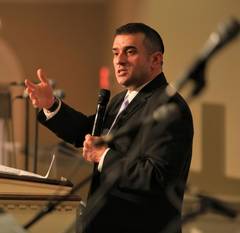- About Us
- Learning
- Resources
- Get Involved
- Membership
- Jobs
Ecstatic Groceries
02/10/2021 04:01:57 PM
Rabbi Brent Spodek
| Author | |
| Date Added | |
| Automatically create summary | |
| Summary |
 I like to davven in the forest, on the mountains, in the wild. The presence of the Creator somehow seems closer there, perhaps because my to-do list seems further away.
I like to davven in the forest, on the mountains, in the wild. The presence of the Creator somehow seems closer there, perhaps because my to-do list seems further away.
Of course, as peak experiences go, nothing compares to the experience that the Israelites had at Sinai. The people were gathered at the foot of the mountain amidst smoke, fire, thunder and the blasts of the shofar and then the Holy One self-revealed and gave the Ten Commandments.
But that was last week. This week, in Parshat Mishpatim, we get the addendum - dozens of laws that follow the Ten Commandments.
We’ve got criminal laws, civil laws, ethical laws, ritual laws, all entwined together. (Of course, those distinctions are ours. The Torah doesn't make any such distinctions.) Laws about the safekeeping of property, seduction, sorcery, bestiality, idolatry, blasphemy as well as the protection of the, the widow, the orphan, and the poor. No thunder, no lightning, no mountaintops.
Of course, I like the mountaintops for hiking and davening, but I don’t live there. There is too much wind, the solitude quickly becomes loneliness and these days, my feet get cold after a few hours.
I live in the plains, and Mishpatim is religion for life down here, where we eat and love and fight and disappoint. As the spiritual teacher Jack Kornfield puts it, after the ecstasy comes the laundry.
There are few things more mundane than loading groceries into the car. Once a week though, loading groceries takes on the air of transcendence for me. I, Cantor Ellen, my 13 year old and some other BHA folks gather at the Church of St Luke and St Andrew to package groceries for folks in need. We load up crates with food struggling people need and bring them out to the cars. There’s nothing special about the act - there are no week-long organic retreats to teach ancient mystical grocery-carrying techniques. Yet there is something profoundly meaningful about knowing that with this mundane act, we’re helping to bring some edible Divine presence to folks who might not otherwise be able to have access to it.
Parshat Mishpatim is precisely that kind of spirituality, teaching us to look for the Holy One not (only) in the blissed out isolation of the mountaintop or the lotus position, but in the messiness of life as well. The Holy One is to be found where we live our lives.
Sometimes we need the peaks, both physical and spiritual, to reinvigorate us, to reorient us and to rededicate us. But Parshat Mishpatim is a parsha for life -- a life laws with marriage, work, lost property, integrity and money and more. Oftentimes, we find the Holy One not but turning away from our to-do lists, but by turning to them with eyes remade for wonder, eyes that can see the holy in the mundane.
Sat, November 8 2025
17 Cheshvan 5786
RABBI BRENT SPODEK

Join Our Mailing List
Privacy Settings | Privacy Policy | Member Terms
©2025 All rights reserved. Find out more about ShulCloud


